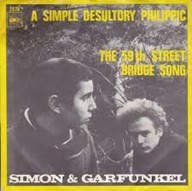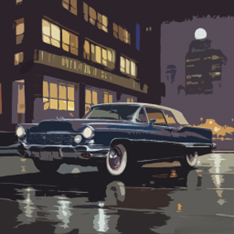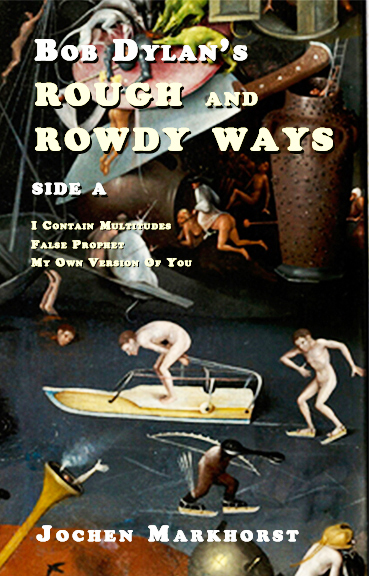by Jochen Markhorst
I Cars are cars
 “One of my deficiencies is my voice sounds sincere,” says Paul Simon in an interview with Rolling Stone (May 2011). “I’ve tried to sound ironic. It doesn’t work; I don’t. I can’t. Dylan, everything he sings has two meanings. He’s telling you the truth and making fun of you at the same time. I sound sincere every time.”
“One of my deficiencies is my voice sounds sincere,” says Paul Simon in an interview with Rolling Stone (May 2011). “I’ve tried to sound ironic. It doesn’t work; I don’t. I can’t. Dylan, everything he sings has two meanings. He’s telling you the truth and making fun of you at the same time. I sound sincere every time.”
Simon is a little too modest about the limited range of his singing voice, but this much is true: the irony, snark and sarcasm that Dylan manages to convey in his singing, especially in the mercurial years of 1965-1966, are beyond Simon’s reach. On the other hand, he is a grandmaster, comparable to Randy Newman, in the field of quiet understatements, dry humour and feigned silliness. “50 Ways To Leave Your Lover”, “Paranoia Blues”, “Have A Good Time”… Paul Simon’s palette certainly has more colours than just sincerity.
He does not reveal where he has “tried to sound ironic”, but Simon refers to Dylan in the same breath, so the link with “A Simple Desultory Philippic” (1965 and 1966) is quickly made. Whether he sounds ironic there is debatable, but he surely does try very hard to sound like Dylan. In any case, it is a Dylan pastiche time has been kind to. At the time, it was considered somewhat bland, it was misunderstood (ironically as a despicable attempt to piggyback on Dylan’s success) and occasionally appreciated with some goodwill, but in the twenty-first century, fans and biographers look back on the song with considerably more affection. At times, perhaps a little too enthusiastic (biographer Marc Elliot calls it a vicious burlesque, a malicious caricature), while on fan sites, fans (with apparently no sense of perspective) declare that it is “great and hilarious” and even “one of the best political songs ever”. Yeah well. Anyway, enjoyable the song certainly is.
There are two versions. The first dates from Simon’s London period, is acoustic and clearly inspired by Bringing It All Back Home. Simon copies “It’s Alright Ma (I’m Only Bleeding)” on his guitar and rattles off verses such as:
I was Union Jacked, Kerouac'd John Birched, stopped and searched Rolling Stoned and Beatled till I'm blind I've been Ayn Randed, nearly branded Communist 'cos I'm lefthanded: That's the hand I use, well, never mind!
The recording ends up on the curious solo album The Paul Simon Songbook (1965), a record without Art Garfunkel recorded in London that had to satisfy the sudden demand for a folky Paul Simon. It is a ramshackle, shabby mishmash of songs from the flop Wednesday Morning 3.A.M. (“The Sounds Of Silence”, for example), new songs and songs that would be re-recorded a year later for Simon & Garfunkel’s breakthrough album Parsley, Sage, Rosemary And Thyme.
The latter album includes another “A Simple Desultory Philippic”. For this second version, Simon first changed the lyrics; many names were altered. The first verse now begins with:
I been Norman Mailered, Maxwell Taylored I been John O'Hara'd, McNamara'd
But that is not the most radical change. The more striking difference is the changed musical background. Dylan had released Highway 61 and Blonde On Blonde meanwhile, which led Paul Simon to take the original step of updating the music; he copies the mercurial sound, discards “It’s Alright Ma” and now chooses “From A Buick 6” as the model for the music. A challenge, of course, as Simon’s sheer neurotic drive for perfection in production is notorious . But it must be said: this one time it does sound – by Paul Simon standards that is – quite gritty. Well, sort of unpolished anyway.
Incidentally, Dylan’s success inspires producer Tom Wilson, without Paul Simon’s knowledge, to create a “folk rock” remix of the flop “The Sounds Of Silence”. We all know how that ends: The revised, updated version becomes a huge global hit, even being distinguished, somewhat debatably, as “the quintessential folk rock release” (Frank Hoffmann, Encyclopedia of Recorded Sound, 2005). The astronomical sales figures lead to a hasty reunion of Simon and Garfunkel and ultimately to the duo’s elevation to pop legend status.
“From A Buick 6”, on the other hand, is sometimes dismissed as filler, as an unremarkable interlude on an album full of timeless classics. And alright, between songs like Rolling Stone, It Takes A Lot and Thin Man, the Buick shines a little less brightly than it would on its own, somewhere on a deserted parking deck in the moonlight. Separated from that overwhelming side A though, “From A Buick 6” comes into its own: one of those mercurial gems from the heyday of a genius artist, a bittersweet, unrestrained blues rock full of half-familiar references and eccentric metaphors.
Like half of the songs on Highway 61, the title has no direct connection to the lyrics. The Buick 6 series was produced from 1914 to 1930, so at most the title has a kind of emotional link to the roots of the music in the song, much like “Highway 61” has a link to the forefathers of the blues. And then there may be, as a bonus, a more personal touch: the Zimmermans used to have a Buick at home. In Chronicles, the bard recalls family trips to Duluth in the “old Buick Roadmaster”, the car in which Dylan learned to drive, the brand to which he remained loyal in later years. The poet probably associates a Buick 6 with something like old and familiar or of lasting value.
At least more so than Paul Simon does:
Cars are cars
All over the world
Similarly made
Similarly sold
In a motorcade
Abandoned when they’re old
Cars are cars
All over the world
("Cars Are Cars", Hearts And Bones, 1983)
To be continued. Next up: From A Buick 6 part 2: Torn Between Two Lovers
Jochen is a regular reviewer of Dylan’s work on Untold. His books, in English, Dutch and German, are available via Amazon both in paperback and on Kindle: 
- Blood on the Tracks: Dylan’s Masterpiece in Blue
- Blonde On Blonde: Bob Dylan’s mercurial masterpiece
- Where Are You Tonight? Bob Dylan’s hushed-up classic from 1978
- Desolation Row: Bob Dylan’s poetic letter from 1965
- Basement Tapes: Bob Dylan’s Summer of 1967
- Mississippi: Bob Dylan’s midlife masterpiece
- Bob Dylan’s Greatest Hits
- John Wesley Harding: Bob Dylan meets Kafka in Nashville
- Tombstone Blues b/w Jet Pilot: Dylan’s lookin’ for the fuse
- Street-Legal: Bob Dylan’s unpolished gem from 1978
- Bringing It All Back Home: Bob Dylan’s 2nd Big Bang
- Time Out Of Mind: The Rising of an Old Master
- Crossing The Rubicon: Dylan’s latter-day classic
- Nashville Skyline: Bob Dylan’s other type of music
- Nick Drake’s River Man: A very British Masterpiece
- I Contain Multitudes: Bob Dylan’s Account of the Long Strange Trip
- Bob Dylan’s Rough And Rowdy Ways – Side B
- Bob Dylan’s High Water (for Charley Patton)
- Bob Dylan’s 1971
- Like A Rolling Stone b/w Gates Of Eden: Bob Dylan kicks open the door
- It Takes A Lot To Laugh, It Takes A Train To Cry b/w Just Like Tom Thumb’s Blues – Bob Dylan’s melancholy blues
- Bob Dylan’s Rough And Rowdy Ways – Side A

Owning Ford’s Thunderbird (Tab Hunter) or GM’s Bruick (Pearl Bailey) become symbols of achieving the American Dream, signs of their success:
(T)ab hunter leads with his thunderbird/Pearl Bailey stomps him
against a bruick
(Bob Dylan: Tarantula)